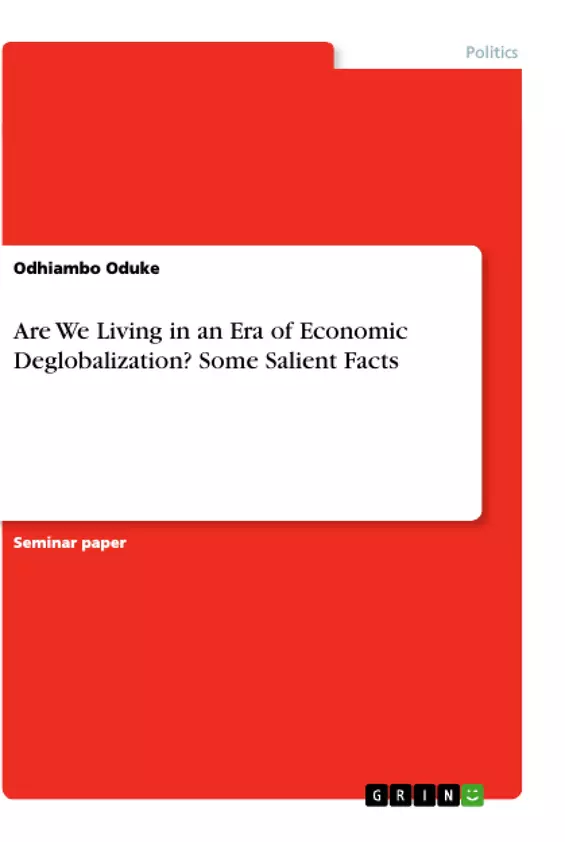This essay tries to answer the question, whether the current time can be described as an era of deglobalization.
The genesis of deglobalization can be traced from the advent of 1997 Asian financial crisis, the 2008 global financial crisis and the world economic order based on liberal, rule based multilateral principles which are resilient and durable. The changing dynamics of the world economic order has motivated deglobalization to take root. This creates a world without superpowers and ironically at the same time still remains to be multiplex and multipolar.
Inhaltsverzeichnis (Table of Contents)
- The genesis of deglobalization
- International organizations
- Donald Trump's presidency
- The UK Brexit
- Globalization 1.0 and Globalization 2.0
- Nation states and governments
- Robert Wade's observation
- The vicious trade wars
- The arms trade
Zielsetzung und Themenschwerpunkte (Objectives and Key Themes)
The text explores the concept of deglobalization and analyzes its emergence, drivers, and impact on the world economic order. It examines the role of international organizations, trade wars, and political events like Brexit in shaping the deglobalization trend.
- The rise of deglobalization
- The role of international institutions
- Economic and political drivers of deglobalization
- The implications of deglobalization on global trade and development
- The persistence of inequalities and power imbalances in the globalized world
Zusammenfassung der Kapitel (Chapter Summaries)
- The genesis of deglobalization: This section traces the origins of deglobalization back to the 1997 Asian financial crisis and the 2008 global financial crisis. It discusses how the changing dynamics of the world economic order have led to the emergence of deglobalization, creating a multipolar world without superpowers. The chapter explores the decline of global trade and the rise of regional blocs as a response to the retreating forces of globalization.
- International organizations: This part examines the disintegration of international institutions like the UN, WTO, IMF, G7, and G20. It highlights the challenges faced by these organizations in maintaining peace, promoting economic progress, and protecting human rights. The chapter criticizes the lack of neutrality and impartiality in the UN Security Council and discusses the failure of global institutions to address global challenges like the Rohingya crisis and the Rwandan genocide.
- Donald Trump's presidency: This section focuses on the deglobalization policies of the Trump administration, which aimed to "make America great again." It explores Trump's anti-liberal world order stance, his rejection of global trade and multilateralism, and his withdrawal from international agreements like the Paris climate change accord. The chapter analyzes Trump's actions as a reflection of America's desire to regain its lost hegemony and its unique status in the world.
- The UK Brexit: This part delves into the UK's decision to leave the European Union as another manifestation of deglobalization. It highlights the UK's desire to control its trade policies, manage its borders, and curb immigration. The chapter discusses the historical context of Brexit, tracing its roots back to the UK's founding role in the European Economic Union and its concerns about the perceived unfairness of EU policies on trade and immigration.
- Globalization 1.0 and Globalization 2.0: This section examines the two periods of globalization, from 1815 to 1914 and from 1980 to 2008. It argues that both periods were marked by a focus on international trade, but under different hegemonic powers: Britain during the first period and the US during the second. The chapter discusses the current slowdown in global trade and the growing adoption of regional trade models as a response to the decline of globalization 2.0.
- Nation states and governments: This part explores the role of nation states and governments in shaping deglobalization. It emphasizes the application of the Westphalian order and its principles of sovereignty, state authority, and territoriality. The chapter discusses how nations are increasingly selective in their trade partnerships, capital inflows, and business activities abroad. This selective approach, according to the text, reflects a desire to insulate and protect domestic markets and economies.
- Robert Wade's observation: This section focuses on Robert Wade's observation of the decline in global trade and the growing imbalance in international trade. It highlights Wade's analysis of the idle cargo ships at the Singapore harbor and argues that the lack of domestic demand for foreign products is contributing to the deglobalization trend. The chapter emphasizes the challenge of achieving global trade balance and the difficulty of recovering from the current deglobalization phase.
- The vicious trade wars: This part explores the role of trade wars in accelerating deglobalization. It focuses on the US-China trade war and the Anglo-Saxon rivalry over fossil fuel trade, particularly in Iran. The chapter highlights the lack of consensus and cooperation between countries with historical roots, demonstrating how deglobalization is manifested in international trade relationships.
- The arms trade: This section delves into the arms trade as a complex and intertwined aspect of deglobalization. It criticizes the hypocrisy of nations that control the proliferation of military infrastructure while simultaneously profiting from arms sales to developing countries. The chapter explores the link between arms purchases and IMF loans and the influence of major arms suppliers on IMF decisions. This demonstrates the ongoing inequalities and power imbalances in the globalized world.
Schlüsselwörter (Keywords)
The text focuses on deglobalization, globalization, international trade, regional blocs, international organizations, trade wars, political events, economic development, global power imbalances, and the role of nation states in shaping the globalized world.
- Quote paper
- Odhiambo Oduke (Author), 2021, Are We Living in an Era of Economic Deglobalization? Some Salient Facts, Munich, GRIN Verlag, https://www.hausarbeiten.de/document/1131034


